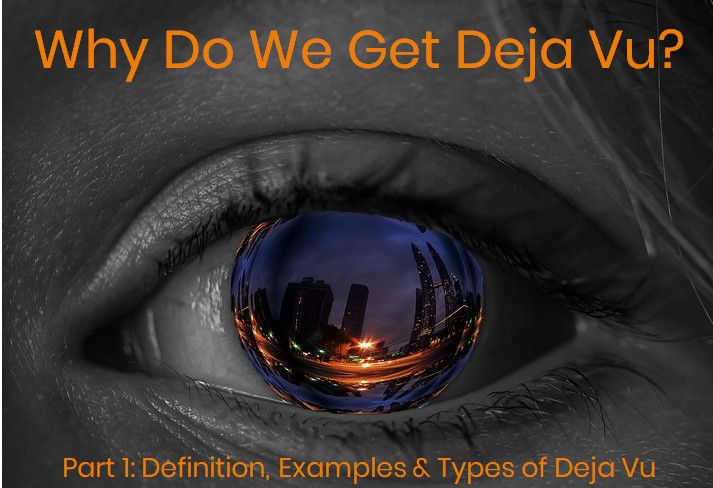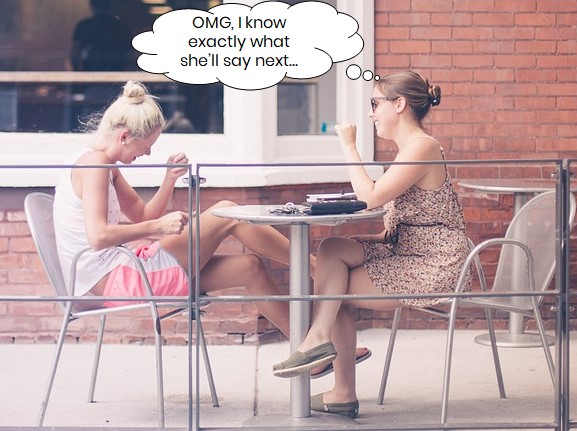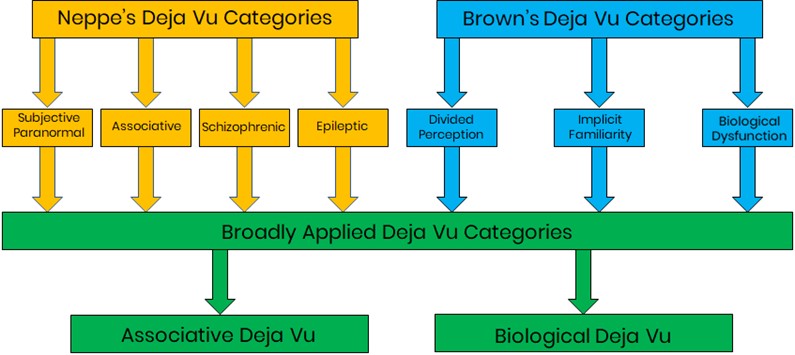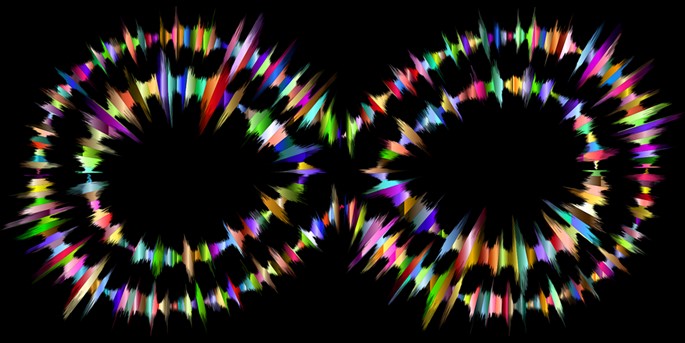
19 Jul Why Do We Get Deja Vu? Part 1: Deja Vu Definition, Examples of Deja Vu Experiences & Types of Deja Vu
 People around the world can give many examples of deja vu experiences, but why do we get deja vu? Before diving into the varying theories trying to explain this strange (and often quite eerie) phenomenon, let’s look at the general deja vu definition, some examples of deja vu experiences (i.e. situations that could suggest that you are having a deja vu experience) and different types of deja vu….
People around the world can give many examples of deja vu experiences, but why do we get deja vu? Before diving into the varying theories trying to explain this strange (and often quite eerie) phenomenon, let’s look at the general deja vu definition, some examples of deja vu experiences (i.e. situations that could suggest that you are having a deja vu experience) and different types of deja vu….
Deja Vu Definition
The French term ‘déjà vu’ literally means (not surprisingly) ‘already seen’. The term was first applied to this phenomenon by Emile Boirac, a French scientist and one of the pioneers of studies into this subject, in 1876 (“L’Avenir des Sciences Psychiques“).
Generally defined as a feeling that you have experienced/seen something before although you know you couldn’t have (although definitions can vary significantly between researchers), deja vu is also often referred to as (depending on how the experience is manifested):
| Term | Meaning Already: |
| Déjà entendu | Heard |
| Déjà éprouvé | Experienced |
| Déjà fait | Done |
| Déjà pensé | Thought |
| déjà raconté | Recounted |
| Déjà senti | Felt or Smelled |
| Déjà su | Known Intellectually |
| Déjà trouvé | Found or Met |
| Déjà vécu | Lived |
| Déjà visité | Visited |
| Déjà voulu | Desired |
In 1981, Dr Vernon Neppe suggested (in concurrence with Prof. B. G. Rogers, Wits University, Johannesburg) several additional terms:
| Term | Meaning Already: |
| Déjà rêvé | Dreamt |
| Déjà rencontré | Met |
| Déjà pressenti | Sensed |
| Déjà parlé | Spoken, as in the act of speech |
| déjà lu | Read |
| Déjà gouté | Tasted |
| Déjà di | Spoken/said, as in the content of speech |
| Déjà connu | Known, as in personal knowledge |
| Déjà arrivé | Happened, literally: arrived |
For ‘already met’ experiences, the term ‘déjà rencontré’ does, by the way, appear to be preferable to ‘déjà trouvé’, as it relates specifically to interpersonal situations (“The Various Manifestations of Déjà Vu Experience”).
What Deja Vu is Not
The term ‘déjà vu’ is often misused in association with precognitive experiences or hallucinations. These associations are, however, mistaken, because:
* While deja vu experiences can give you the feeling that you know precisely what will happen next (and then it does), they happen during a situation/event, not prior to it. True precognitive experiences, on the other hand, reveal something that will happen at some point in the future, not things you have experienced already.
As such, the most likely association between deja vu and precognitive experiences is that precognitive dreams may subsequently cause deja vu feelings.
* True deja vu experiences typically last for somewhere between 10 and 30 seconds. Often brought on by drugs or illnesses (and occasionally associated with a state of ‘heightened awareness), hallucinations, on the other hand, tend to last much longer – as do the ‘false memories’ often experienced by schizophrenics (which are also frequently confused with deja vu).
Examples of Deja Vu
So, what constitutes a deja vu experience? Basically, you may be having such an experience when:
 * You go somewhere new (like a holiday destination, a different shop or maybe a new working environment, for example) and something you see or hear triggers the distinct feeling that you have been there before although you know that you haven’t.
* You go somewhere new (like a holiday destination, a different shop or maybe a new working environment, for example) and something you see or hear triggers the distinct feeling that you have been there before although you know that you haven’t.
* You are talking to a friend and know exactly what he/she is going to say next because “you’ve had this conversation already” (but you know you’ve never talked about this specific topic before).
* Your partner takes you out for a meal and something you taste, or smell, convinces you that you must have been at this restaurant before – but you both know that this is not the case.
In a nutshell, any situation during which a sight, sound, smell or taste makes you believe you have experienced it before although you know that you could not have “been there” before is an example of a potential deja vu experience.
If you’ve had such an experience, you are, by the way, not alone: approximately 60 to 70 per cent of people say they’ve experienced deja vu at least once in their lives.
Different Types of Deja Vu
But, I hear you ask, what causes deja vu? Opinions on this are manifold…
Occuring randomly, only in some people and only for brief moments at a time, deja vu also shows no physical signs and there are no actual witnesses – the only indication that someone is experiencing it is their sudden exclamation “Hey, I’ve been here/done this before – must be deja vu!”

With any data provided stemming from personal recollections and descriptions, it is consequently not an easy subject to study or classify into different types.
This, has, however, not stopped psychologists, paranormal experts, philosophers and others from trying – and over the last two centuries, researchers have come up with over 40 different theories on why and how it happens.
Professor of psychology & author Alan Brown, for instance, believes there are three deja vu types, or categories: deja vu caused by divided perception, implicit familiarity or biological dysfunction (like epilepsy, for example), while D r V. Neppe proposed four categories – including subjective paranormal, associative, schizophrenic and epileptic deja vu – in 1983.
Looking broadly at available research/resources allows this phenomenon to be placed into two categories: associative and biological deja vu.
Associative Deja Vu
Experienced by healthy, ‘normal’ individuals, this deja vu type (category) is quite common and, as the name suggests, associative in nature. Here, something you hear, see, smell, taste or otherwise experience triggers a feeling associated with something you have heard, seen, smelled, tasted or experienced before.
Many researchers believe that this is an experienced based on memory and that it is caused by the brain’s memory centres.
Biological Deja Vu
 Deja vu is also comparatively common in sufferers of temporal lobe epilepsy, who often experience strong feelings of deja vu just before having seizures. Giving researchers a slightly more predictable (‘reliable’) opportunity to study the phenomenon, this has enabled them to identify the brain’s areas from which these deja vu types’ signals originate.
Deja vu is also comparatively common in sufferers of temporal lobe epilepsy, who often experience strong feelings of deja vu just before having seizures. Giving researchers a slightly more predictable (‘reliable’) opportunity to study the phenomenon, this has enabled them to identify the brain’s areas from which these deja vu types’ signals originate.
Some researchers do, however, believe that this type is patently different from what they call “typical deja vu” in that people experiencing it can truly believe that they have been in that precise situation before, as opposed to getting a quickly passing feeling.
Deja vu can also occur with some degree of predictability in people with major psychiatric disorders (like, for instance, schizophrenia, dissociative disorders, depression and anxiety) and has at times been known to become ‘chronic’.
Chronic Deja Vu
People affected by chronic deja vu constantly feel like they’ve experienced things before – including, in some cases, deja vu feelings about deja vu feelings (see “Patients Suffer… Over and Over” for more on this).
It has been suggested by researchers that in such cases, the circuits activated when we remember something become stuck, for lack of a better description, in an ‘on’ position – essentially resulting in the creation of non-existent, false memories.
Part 2 of “Why Do We Get Deja Vu”…
So, how has this phenomenon been studied – and what explanations have researchers come up with? Find out in Part 2: “Deja Vu Studies & Deja Vu Explanations”.
Further Sources/Reading:
“Déjà vu”, Robert Todd Carroll
“Déjà vu as…”, Kornelia Kozovska
“Déjà vu – A Glitch…”, Lynne Malcolm
“The Various Manifestations…”, Pacific Neuropsychiatric Institute




 UK
UK Ire
Ire Can
Can USA
USA Aus
Aus ROW
ROW
